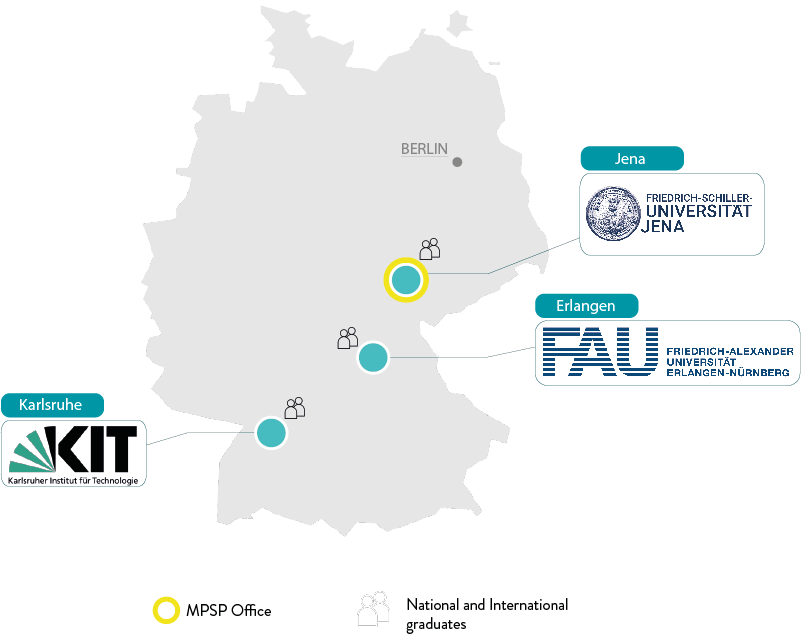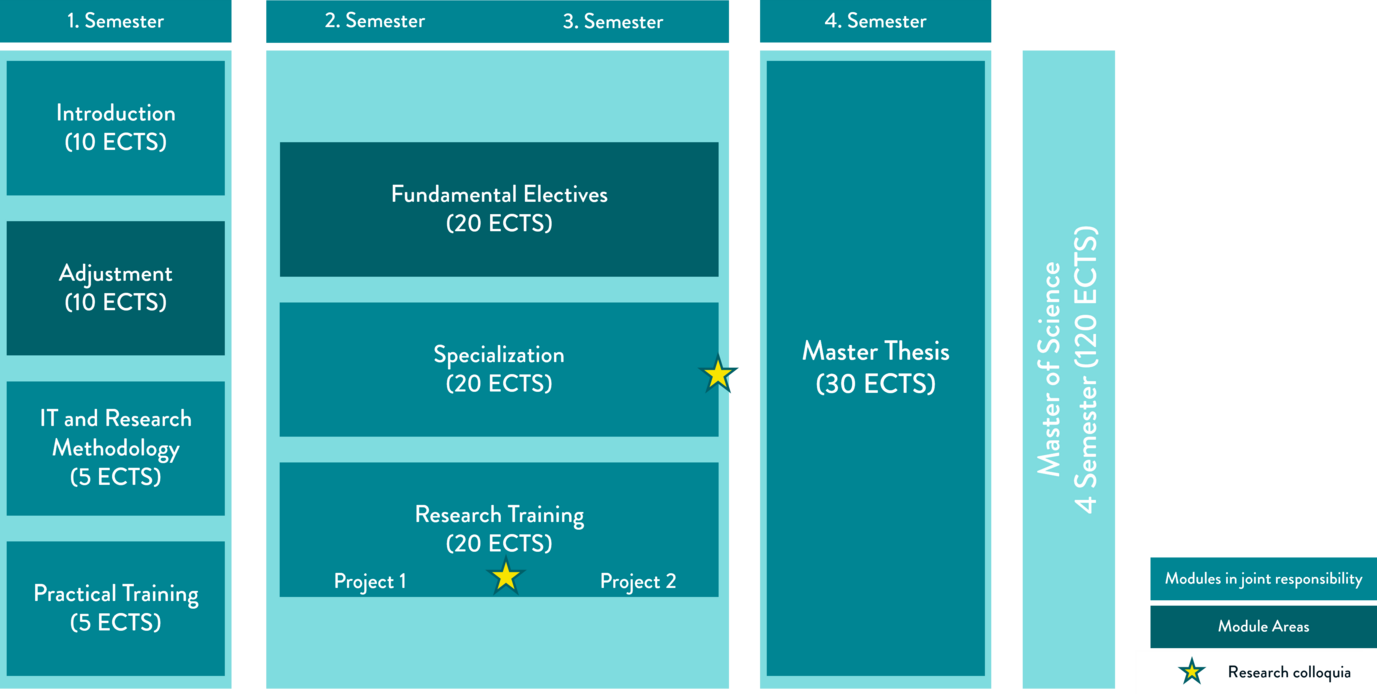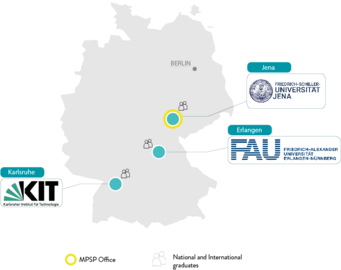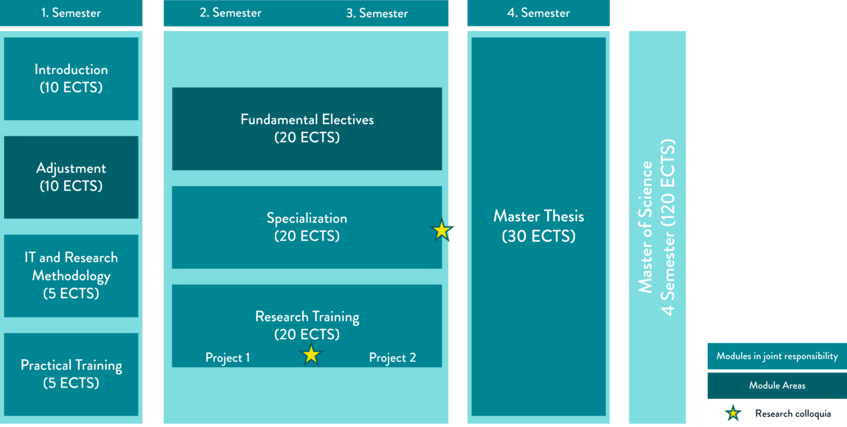MPSP Program: The Study Phase
Master of Photon Science and Technology
During the study phase, MPSP candidates undergo a full-time master's program at three internationally recognized universities within the Max Planck School of Photonics network:

- Friedrich Alexander University (FAU) Erlangen-Nuremberg
- Friedrich Schiller University in Jena
- Karlsruhe Institute of Technology (KIT)
Our teaching universities are world heavyweights of academic and science-related education, as well as epicenters of photonics research.
Beside the university courses, study phase candidates also participate in courses aimed at the development and advancement of scientific and social skills via e-learning or workshops, such as practical laboratory skills training or scientific writing seminars.
In a newly established joint degree program, our study phase candidates can profit from the expertise at all teaching universities in collaborative lectures. Furthermore, students can choose their specialization modules and research topics from the offer of all three universities. This allows for conveying profound theoretical knowledge and practical training as a foundation for their first research projects or even become an expert in a specific research field.
Towards the end of the two years master’s program, the MPSP study phase candidates carry out an internship at one of the network institutes and write their master thesis. The master thesis is written under the supervision of one of the scientists within the MPSP network (so-called "Fellows"). Fellows also assist the PhD candidates in identifying potential research topics for the subsequent research phase of the program.
Spring and Autumn School
The MPSP organizes spring and autumn schools in which all PhD candidates from different locations get to know each other and exchange experiences and research ideas. We provide different expert and soft skill courses to prepare the PhD candidates for their research and their professional lives. In scientific colloquia, students present the results of their Specialization modules and Research Training. Moreover, spring and autumn schools aim to connect the study phase candidates with MPSP Fellows who match their research interests and could act as PhD supervisors. All study phase candidates are encouraged to conduct their curricular internships and master theses at the various locations within the MPSP network.
If you want to know what a MPSP Spring School looks like, take a look here!
Study Program
The study program is research-oriented and focuses on acquiring research-relevant competencies. Students will learn within a cross-location network of the three universities. Central modules are taught jointly by lecturers from all three universities. The laboratory training involves all locations. In terms of specialization, students have access to the full range of research focuses pursued at the individual locations. The course of study is divided into three parts. The first semester is dedicated to acquiring subject-relevant basic competencies and aligning heterogeneous prior knowledge. The second and third semesters focus on specialization, imparting research-relevant competencies. The fourth semester concludes with the master's thesis as an independent scientific achievement.
Curruciulum Composition:

Study Locations
ERLANGEN
Erlangen is a university city located in northern Bavaria, close to Nuremberg. The Friedrich Alexander University Erlangen-Nürnberg (FAU) is Bavaria's second largest university with around 40,000 students.
The city has a long tradition in optics research and teaching and is home to the Max Planck Institute for the Science of Light.
More about the Master's program in Erlangen →JENA
Known as the "City of Light," Jena is a center for optics and photonics in Thuringia. The Friedrich Schiller University Jena hosts about 17,000 students and is one of Germany’s oldest universities.
Nestled along the Saale River and surrounded by scenic limestone slopes, Jena offers both academic excellence and space for many outdoor activities.
More about the Master's program in Jena →KARLSRUHE
Karlsruhe, known as the “Residence of Law,” is home to Germany’s Federal Court of Justice and the Federal Constitutional Court. It is also the location of the renowned Karlsruhe Institute of Technology (KIT).
KIT is part of the Helmholtz Association and was named Germany’s top university for engineering and natural sciences in 2024, educating over 22,000 students.
More about the Master's program in Karlsruhe →Costs Associated with the Degree Program
The fees for students of the M.Sc. Photon Science and Technology apply for one semester and amount to the following for the current semester (winter semester 2025/26):
| Administrative fee (KIT Karlsruhe) | €80.00 |
| Student Services (Studierendenwerk) fee (KIT Karlsruhe) | €109.50 |
| Student body contribution (KIT Karlsruhe) | €12.00 |
| Student ID card (thoska) – FSU Jena | €20.00 |
| Total | €221.50 |
|---|
Additionally, tuition fees of 1500 € per semester may apply for non-EU nationals.
Changes to the amount of all fees are possible until the start of the programme.
More information about the tuition fee here.
